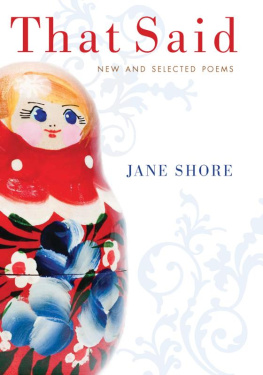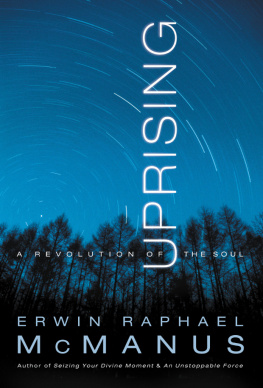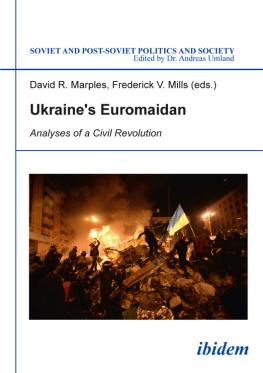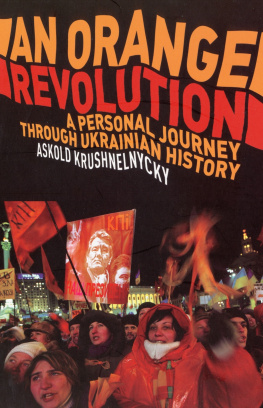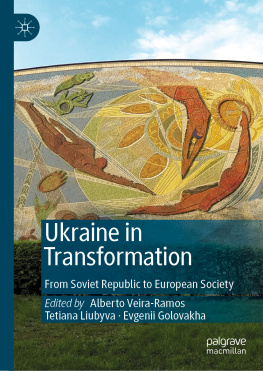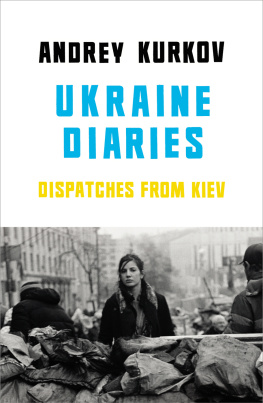The Ukrainian Night
The
Ukrainian
Night
An Intimate History of Revolution
Marci Shore

Published with assistance from the Kingsley Trust Association Publication Fund established by the Scroll and Key Society of Yale College
Copyright 2017 by Marci Shore.
All rights reserved.
This book may not be reproduced, in whole or in part, including illustrations, in any form (beyond that copying permitted by Sections 107 and 108 of the U.S. Copyright Law and except by reviewers for the public press), without written permission from the publishers.
Yale University Press books may be purchased in quantity for educational, business, or promotional use. For information, please e-mail sales.press@yale.edu (U.S. office) or sales@yaleup.co.uk (U.K. office).
Set in Janson type by Integrated Publishing Solutions.
Printed in the United States of America.
Library of Congress Control Number: 2017941041
ISBN 978-0-300-21868-8 (hardcover : alk. paper)
A catalogue record for this book is available from the British Library.
This paper meets the requirements of ANSI/NISO Z39.48-1992 (Permanence of Paper).
10 9 8 7 6 5 4 3 2 1
Kalewkowi i Talijce, in hope of a better world to come
?
,
!
...
Do you know
the Ukrainian night?
No,
you do not know the Ukrainian night!
Here
the sky
turns black
from smoke...
Vladimir Mayakovsky, (Debt to Ukraine), 1926
Contents
Preface
The Ukrainian revolution of 20132014 on the Maidan was the most extraordinary thing I have seen in the quarter century I have been coming to Eastern Europe. The political became the existential. I saw friends and colleagues I had known for years making decisions they would have found unimaginable a few months earlier. People who valued their privacy suddenly laid bare their souls. Though I eventually made several trips to Lviv, Kiev, and Dnipropetrovsk (renamed Dnipro in May 2016), I watched the Maidan mainly from Vienna, where I was living that year. Being close enough to Kiev to see Ukrainian friends who were traveling back and forth, and at the same time immersed in the media culture of the West, I felt how little this revolution was understood. Journalists and politicians commented on NATO policy, oil pipelines, and international finance, but not on the transformation of human souls.
Early in the twentieth century the Polish philosopher Stanisaw Brzozowski wrote, What is not biographyis nothing at all. This is my point of departure. This book began as a more modest essay, a portrait of the Ukrainian literary translator Jurko Prochasko. The original title was It was My Choice: A Phenomenology of the Ukrainian Revolution. This phenomenology was in the spirit of Edmund Husserls philosophy: a description of revolution as pure subjective experience. This book is not an analysis of contemporary politics in Ukraine; I make no arguments or predictions about political outcomes. This is an exploration of revolution as a lived experience given to individuals.
I try in the pages that follow to understand what pushed some of my own friends and colleaguespeople like myself, like ourselvesto places where they had never expected to find themselves, what pushed them towards a willingness to risk their lives. All of them experienced a moment when it was imperative to make a choice. This was choosing in the strongest, existentialist sense described by Jean-Paul Sartre: Life is nothing until it is lived; but it is yours to make sense of, and the value of it is nothing else but the sense that you choose. Time and time again I heard, in different languages, it was my choice.
Dostoevsky once wrote, Sartre goes on to say, If God did not exist, everything would be permitted; and that, for existentialism, is the starting point. Everything is indeed permitted if God does not exist, and man is in consequence forlorn, for he cannot find anything to depend upon either within or outside himself. Sartre tried to move man in the place vacated by God; Marx tried to move History there. The Soviet Unionthe materialization of Marxist metaphysicswas modern mans most audacious attempt to replace God. Its failure, and more broadly the failure of Marxism, the last of the grand narratives, arguably brought about the end of modernity as such.
Postmodernity began with the relinquishing of attempts to replace God: now not only was God dead, but moreover there was no one and nothing to take His place. The fate of truth in such a world was not so clear. Nearly a quarter century after the fall of communism, the Ukrainian revolution illuminated anew the border between modernity and postmodernity. It also raised questions about what would come next. With the revolution of 2014, the postmodern ended in Ukraine, wrote the Russian historian Ilya Gerasimov. We still do not know how to conceptualize this new reality.
The Ukrainian revolution on Kievs Maidan, though bound up with a particular history, simultaneously laid bare universal questions about the nature of selfhood, the plasticity of temporality, and the fate of truth. When does a protest cross an invisible boundary to become a revolution? What brings parents and children together, and what splits generations apart? Under what circumstances does fear disappear? How is revolutionary time different from the time of byt, the untranslatable Russian word for the heaviness of everyday life? How are the experiences of time and space altered? Why does the distinction between night and day fade? How is selfhood both realized and overcome by solidarity? What does it mean for people to film themselves being shot? What conditions allow the boundary between reality and fiction to be effaced?
The second part of this book, about the aftermath of the Maidan and the war in the Donbas, explores in particular this last question. When the Iron Curtain fell in 1989, Francis Fukuyama declared the End of History: the eighteenth century Enlightenment, celebrating its faith in reason and truth, had conceived a teleology of progress that seemingly concluded in liberal democracy. So it is perhaps fitting that the end of the End of History be brought about by a discomposing fusion of Romantic will and post-factuality.
In this world after the End of History, both American capitalism and post-Soviet oligarchy have produced a specialty PR market for gangsters; and reality television has done away with the distinction between the fictional and the real. This is a world where warlords can promote themselves on Instagram and Twitter, and Ukrainian and American oligarchs with presidential aspirations can share a strategic advisor.
Karl Marx was untimely when he wrote, all that is solid melts into air. In the mid-nineteenth century, the observation was still premature. Perhaps this is no longer the case: in a post-factual world, much that seemed solid has melted into air. Yet people remain. This is a work of nonfiction, a history of a revolution as it was experienced by those who chose to take part in it. The purpose of writing history is like that of writing literature: to allow the reader an encounter with alterity, an imaginative leap into another time and place, a possibility of understanding the Other. In this sense, I hope that the chapters of this book about the war in the Donbas can play some small role in providing a human face to yet another tragedy of the kind Neville Chamberlain described as a quarrel in a faraway country between people of whom we know nothing.
New Haven
January 2017
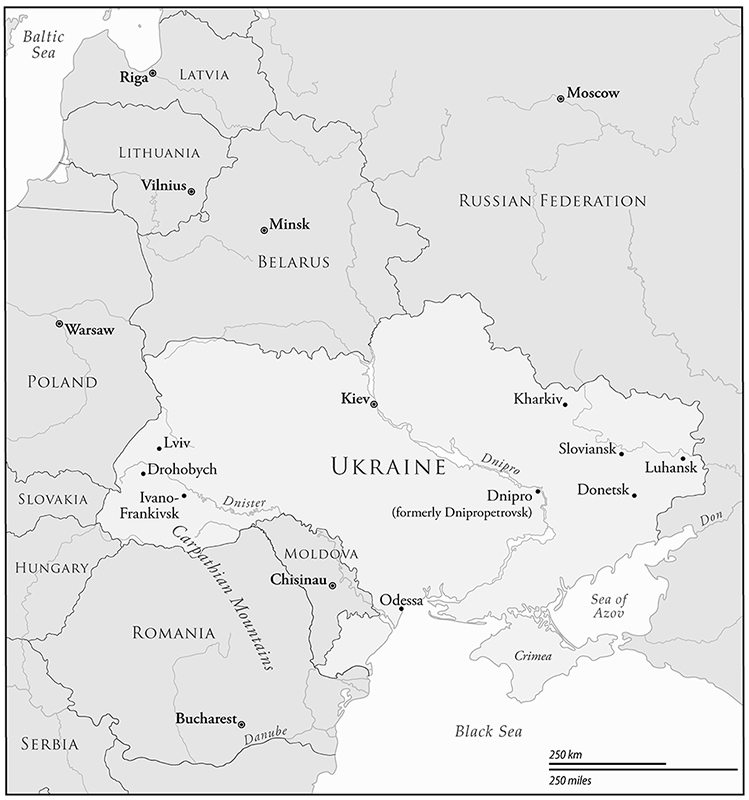
Next page

